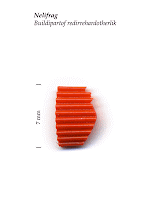It's a bit of a stretch to say that this is a kind of intellectual repository or an online collection of the Classics put on the web so that access can be more widespread, but nonetheless Brian Collier's website Very Small
 Objects is entertaining, aesthetically pleasing to look and also contains a very creative "classification system.
Objects is entertaining, aesthetically pleasing to look and also contains a very creative "classification system.The objects featured on this site are close-up photos of very small items found anywhere and everywhere. Collier accepts all objects submitted to him and names them based on a classification system that is largely influenced by satirical version of the scientific nomenclature, comprising of fragments of words from the English language. He then photographs each object complete with measurements posted within the picture so the user can see how small the dimensions are. All the photos are stored in a "database." The criteria for photographing each submission is that they be of a certain size, with a new name based on Collier's classification system, non-living (Collier opposes the collection of live specimens), and somewhat distinguishable of what it once was.
As for metadata or ways to search the collection, this is an area that is sorely sorely sorely needed. Each item in the database is classified by the first part of its name and pro
 gresses through the names in a list format with a little thumbnail picture for reference. For example, all the things that were never alive (ie rocks, plastic) start off with the name Neli, and if it's a part of a whole= Nelipart and so on; all the Neliparts are grouped together. There is no search feature to easily access a particular specimen. As for metadata about each object, the only metadata made available on the site is the "name" and its dim
gresses through the names in a list format with a little thumbnail picture for reference. For example, all the things that were never alive (ie rocks, plastic) start off with the name Neli, and if it's a part of a whole= Nelipart and so on; all the Neliparts are grouped together. There is no search feature to easily access a particular specimen. As for metadata about each object, the only metadata made available on the site is the "name" and its dim ensions.
ensions.The collection itself is pretty neat to look. There are all kinds of itty-bitty things. During my examination of the site, I saw a fragment of a green M&M, electrical components, beachcombing loot, dried up curls of a leaf, a watch gear, the list goes on. It's an eccentric collection based on a classification system. Collier exhibits his collection around the nation and in Europe.
As for the audience, I think it's geared towards people who are knowledgeable about classification systems, naming items, and has a kick out of emulating the scientific nomenclature system: namely information professionals and scientists or just about anyone willing to take the time to peruse this very small object collection.
No comments:
Post a Comment